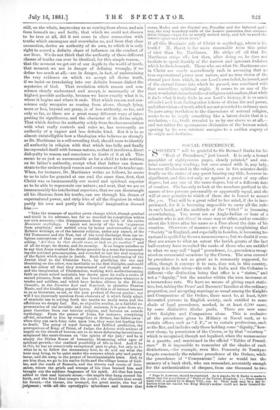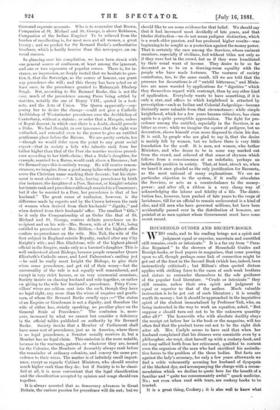SOCIAL PRECEDENCE.
" SOCIETY " will be grateful to Sir Bernard Burke for his "Book of Precedence," just issued. It is only a bound pamphlet of eighty-seven pages, clearly printed,* and con- tains scarcely any reading ; but once armed with it, any lady, however ill-educated in the subject, can in five minutes decide finally on the status of any guest bearing any title, however in- significant, and this not only as against a guest of any other degree, but any one of the same degree, but of a different date of creation. She has only to look at the numbers prefixed to the names of two persons presumably or apparently equal, and she will at once perceive to which of them she is bound to accord the pas. That will be a great relief to her mind, if she is inex- perienced, for it is becoming impossible to carry all the rules in one's head, and the multitude of the " titled " is becoming overwhelming. You never see an Anglo-Indian or hear of a colonist who is not i/gcore, in some way or other, and as sensitive about the letters after his name as a Peer about the date of his creation. Observers of manners are always complaining that " Society " in England, and especially in London, is becoming too vastand is spoiled by its own numerousness; but we doubt if even they are aware to what an extent the lavish grants of the last half-century have recruited the ranks of those who are entitled to what we may call "legal" precedence, i.e., precedence recog- nised on ceremonial occasions by the Crown. The area covered by precedence is not so great as is commonly supposed, for office, though it. conveys it to men, does not, in this country, convey it to their wives—the rule in India and the Colonies is different—the distinction being that office is a "status," and not a " dignity," but the number within the area increases at a tremendous rate. We have no means of giving exact statis- tics, but, taking the Peers' and Baronets' families at the ordinary proportion, and accepting marriage as usual among the Knights and Companions of the Orders, there must be, at least, 9,600 decorated persons in English society, each entitled to some shade of legal precedence, marked, in at least 6,500 cases, by some distinctive titular prefix. There are now some 1,900 Knights and Companions alone. This is exclusive of the precedence given to Military or Naval rank, or to
certain offices, such as "J. P.," or to certain professions, such as the Bar, and includes only those holding some "dignity," how- ever cheap, by permission of the Crown, or by that " courtesy " which is recognised, though not legalised, when the names occur in a gazette, and sanctioned in the official "Tables of Preced- ence." It is impossible to remember all the shades of such distinctions,—for example, even Mrs. Ponsonby de Toinkyns forgets constantly the relative precedence of the Orders, while the precedence of "Companions ': inter se would tax the memory of a bank clerk, who can remember, accurately enough for the authentication of cheques, from one thousand to-two
• Page 10, however, should be reprinted. As it stands, Sir B. Burke is made to affirm that the pi ecedence of "Peers of the United Kingdom," i.e., Peers crested alum 1700, Is settled by 11 Henry VIIL, cap. 10. Their rank may be.. fair de- duction from the statute, but Sing Henry's nobles could not have foretold the Acts of Union.
thousand separate accounts. Who is to remember that Brown, Companion of St. Michael and St. George, is above Robinson, Companion of the Indian Empire? To be relieved from the burden of recollecting is, for most men and all women, a great luxury ; and we predict for Sir Bernard Burke's authoritative brochure, which is hardly heavier than this newspaper, an un- usual success.
In glancing over his compilation, we have been struck with one general source of confusion, at least among the ignorant, and one or two exposures of popular errors. There is, for in- stance, an impression, so deeply rooted that we hesitate to ques- tion it, that the Sovereign, as the source of honour, can grant any precedence she will ; and this theory has been acted on at least once, in the precedence granted to Maharajah Dhuleep Singh. But, according to Sir Bernard Burke, this is not the case, much of the precedence among Peers being settled by statutes, notably the one of Henry VIII., quoted in a foot- note, and the Acts of Union. The Queen apparently—sup- posing her to desire the change—could not give a Catholic Archbishop of Westminster precedence over the Archbishop of Canterbury, without a statute; or order that a Marquis, unless of Royal descent, in which case there is a doubt, should precede a Duke. We had thought, in our ignorance, that the right was unlimited, and extended even to the power to give an untitled gentleman place before the Barons. We are pretty certain, too —though we would defer upon the point to any great social expert—that in society a lady who inherits rank from her father higher than that of the Peer she marries receives preced- ence according to her birth-claim ; that a Duke's daughter, for example, married to a Baron, would rank above a Baroness ; but Sir Bernard says this is entirely wrong. He will receive remon- strances, we imagine, from a good many ladies who carefully pre- serve the Christian name marking their descent ; but his state- ment is most absolute :—" A lady, having precedence by birth (for instance, the daughter of a Peer, Baronet, or Knight) retains her innate rank and precedence although married to a Commoner; but if she be married to a Peer, her precedence is that of her husband." The great cause of confusion, however, is the difference made by experts and by the Crown between the rank of women when derived from their husbands' "dignity," and when derived from their husbands' office. The smallest "title," be it only the Companionship of an Order like that of St. Michael and St. George, confers definite precedence on its recipient and on his wife—Mrs. Brown, wife of a C.M.G., being entitled to precedence of Mrs. Million,—but the highest office confers no precedence on the wife. Mrs. Tait, the wife of the first subject in England outside Royalty, ranked after any City Knight's wife ; and Mrs. Gladstone, wife of the highest-placed official in the Empire, ranks only as a baronet's daughter. This is well understood about Bishops, because people remember Queen Elizabeth's Catholic sneer, and Lord Palmerston's smiling jest —he said he really must knight the Bishops, to give their wives some precedence, and get rid of their worry—but the universality of the rule is not equally well remembered, and except in very strict houses, or on very ceremonial occasions, Society insists on classing husband and wife together, or rather on giving to the wife her husband's precedence. Privy Coun- cillors' wives are seldom sent into the ruck, though they have no legal right, any more than the wives of esquires and gentle- men, of whom Sir Bernard Burke cruelly .says :—" The status of an Esquire or Gentleman is not a dignity, and therefore the wife of either has, strictly speaking, no peculiar place on the General Scale of Precedence." The confusion is, more-
over, increased by what we cannot but consider a deficiency in the official tables published on authority by Sir Bernard Burke. Society insists that a Member of Parliament shall have some sort of precedence, just as in America, where there is no legal precedence, a Senator usually receives it, but a Member has no legal claim. This omission is the more notable, because in the warrants, patents, or whatever they are, issued for the Colonies, the Members of Assembly always rank before the remainder of ordinary colonists, and convey the same pre- cedence to their wives. The matter is of infinitely small import- ance, except as regards Cabinet Ministers, who should receive much higher rank than they do; but if Society is to be classi- fied at all, it is more convenient that the legal classification and the classification accepted by opinion and usage should run together.
It is always asserted that as democracy advances in Great Britain, the curious passion for precedence will die out; but we
should like to see some evidence for that belief. We should say that it had increased most decidedly of late years, and that titular distinction—we do not mean pedigree distinction, which is a much older passion, and has produced higher results—was beginning to be sought as a protection against the money power. That is certainly the case among the Services, whose eminent members, especially if civilians, feel without titles not only as if they were lost in the crowd, but as if they were humiliated by their usual want of income. They desire to be so far decorated as to be on a drawing-room equality with the people who have made fortunes. The vastness of society contributes, too, to the same result, till we are told that the pressure for decorations is of "untold bitterness," and Minis- ters are more worried by applications for " dignities " which they themselves regard with contempt, than by any other kind of application. Everybody wants to have something, if it is only a star, and offices to which knighthood is attached by prescription—such as Indian and Colonial Judgeships—become distinctly more valuable from that circumstance ; while simple knighthood, which for a few years became ridiculous, has risen again to a quite perceptible appreciation. The fight for pre- cedence among the untitled, especially in the Services, is as bitter as ever ; while we imagine the squire of pedigree, but no decoration, shows himself even more disposed to claim his due. It is said, by people who are glad to say it, that the desire is mainly felt by women, but we believe there is very little foundation for the scoff, it is men, not women, who bother Ministers, and who desire to be in some way marked out from the crowd, and relieved of that sense of shyness which follows from a consciousness of an indefinite, perhaps an indefinable position in society. That, at least, struck us, when we heard it once pleaded as the only justification for Baronets, as the most rational of many explanations. We see no particular objection to the system, if it really stimulates the Services, or acts as a counterbalance to the money- power ; and after all, a ribbon is a very cheap way of acknowledging the labour and fidelity of a life. The distri- bution has, however, been pushed of late years to the verge of lavishness, till for an official to remain undecorated is a kind of slur, and till men who have governed millions, but have been accidentally passed over in the distribution of honours, are pointed at as men against whom Government must have some secret record.



































 Previous page
Previous page